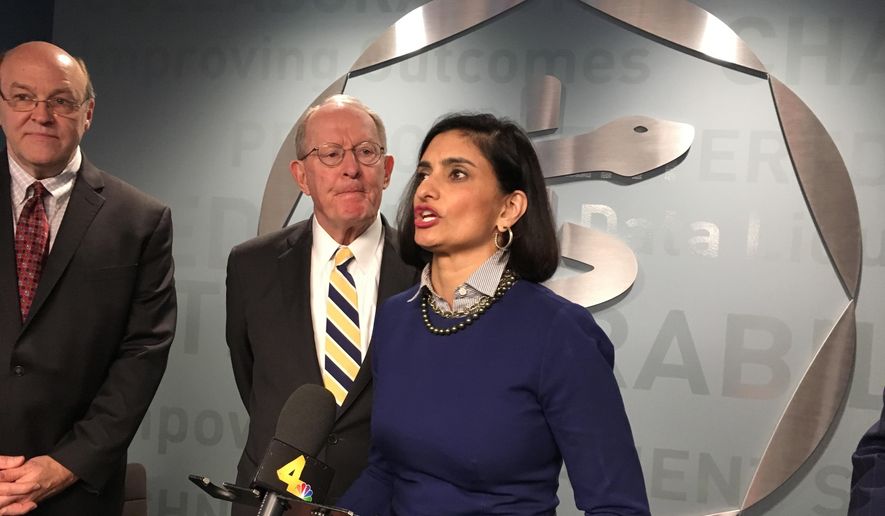States looking to get around Obamacare’s strictures will soon be able to use federal money to help people buy cheaper, skimpier plans, so long as they don’t also eliminate plans that met Obamacare’s earlier requirements, the Trump administration said Monday.
The new rules will let governors use federal money to help people buy “association” or “short-term” insurance plans that don’t cover the 2010 law’s full menu of benefits.
That could make plans more attractive to healthy people don’t want — and/or struggle to afford — more robust plans the Obama administration said they had to purchase.
States could also offer more generous subsidies to entice younger, healthier people who are needed to stabilize premiums in the individual market.
“They can decide where the subsidies are targeted,” said Seema Verma, administrator at the Centers for Medicare and Medicaid Services, which oversees the Obamacare markets. “We’re trying to move away from that one-size-fits-all approach.”
CMS said it will release a packet of “waiver concepts” in the coming weeks to give states a better sense of what kinds of state proposals federal regulators are willing to approve.
The likely upshot is some states will feel emboldened to move away from Obamacare’s top-down approach, with Republican governors in particular exploring cheaper options with fewer mandates.
Analysts said it’s unclear whether states will take the leap and request big changes, though the administration appeared to be offering significant leeway.
“What it does is it makes it much easier for states to shape their individual insurance markets, and gives them a lot more options,” said Chris Sloan, a director at Avalere Health, a D.C.-based consultancy.
Plans are baked in for the coming year, so consumers probably won’t feel any changes until at least 2020, yet the announcement hardened battle lines heading into the midterm elections.
Republicans said Mr. Trump is cleaning up the shaky marketplaces left by his predecessor, after the years of premium increases in the law’s exchanges have priced out healthy people who do not qualify for federal subsidies.
Democrats said the move would splinter the markets, forcing sicker Americans to pay more — a contrast with the GOP’s campaign-season pledge to protect people with preexisting conditions.
“The American people should look at what Republicans are doing, rather than what they’re saying, when it comes to health care,” said Senate Minority Leader Charles E. Schumer.
The Trump administration is using a waiver system built into the original 2010 Affordable Care Act that was supposed to free states to act as laboratories for health care reform. The idea was to let states experiment in ways that build or improve on the law, while covering the same amount of people with coverage that’s just as comprehensive.
But CMS said the guardrails were so strict that few states were experimenting beyond offering “reinsurance” programs that subsidize extra-pricy customers.
Ms. Verma said the Obama administration was too focused on types of services covered, which led to high premiums and too few choices. She said the Trump administration will focus on making sure people have “access” to insurance plans they want.
Analysts said the move threatens to split the individual market, forcing Americans with pre-existing conditions to pay more for robust coverage as healthier people, who right now subsidize the sick, instead opt for cheaper plans.
In a press call, CMS argued robust, Obamacare-compliant coverage will still be available to whoever wants it, and that insurers must accept anyone who seeks insurance.
• Tom Howell Jr. can be reached at thowell@washingtontimes.com.




Please read our comment policy before commenting.